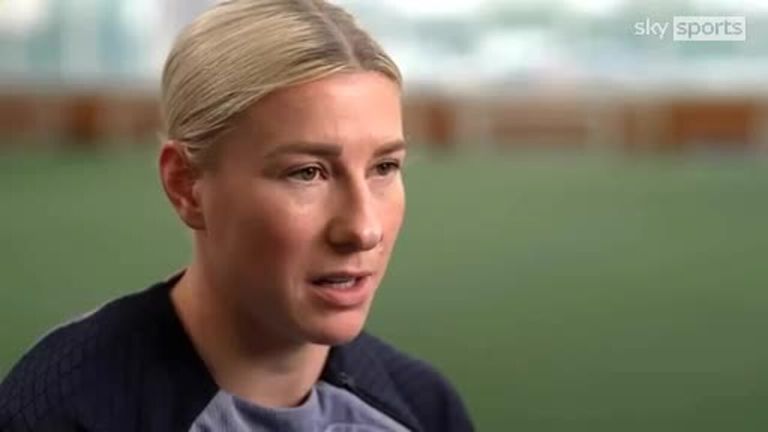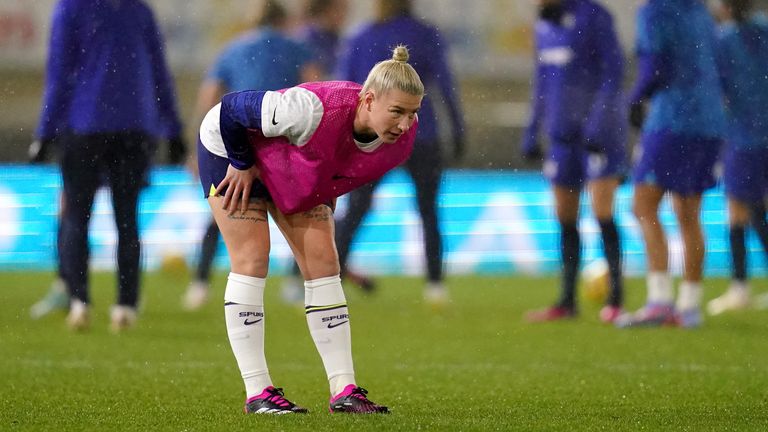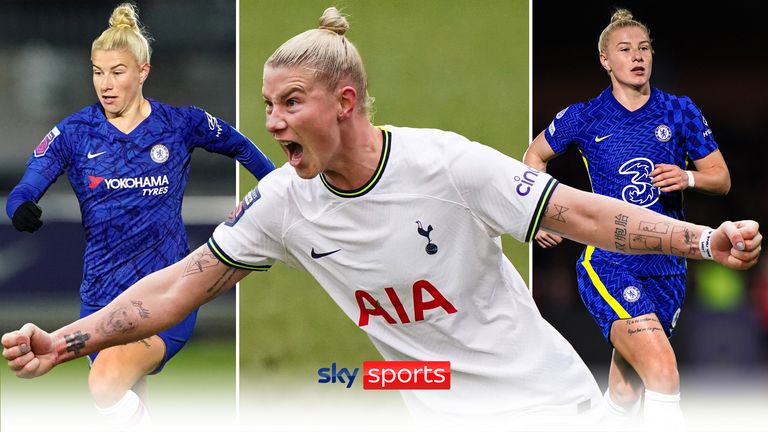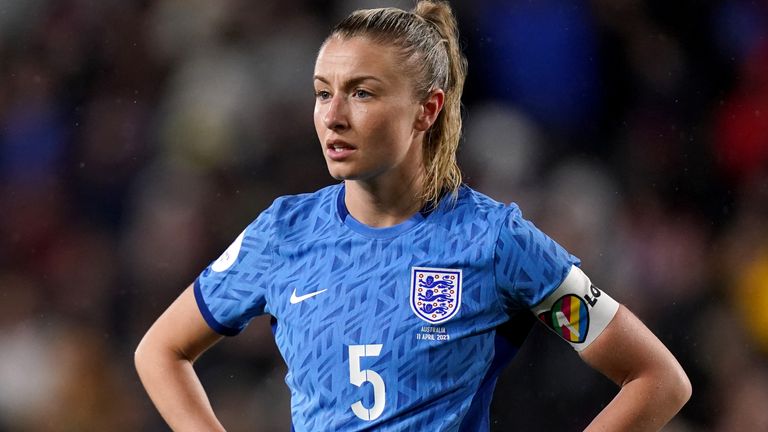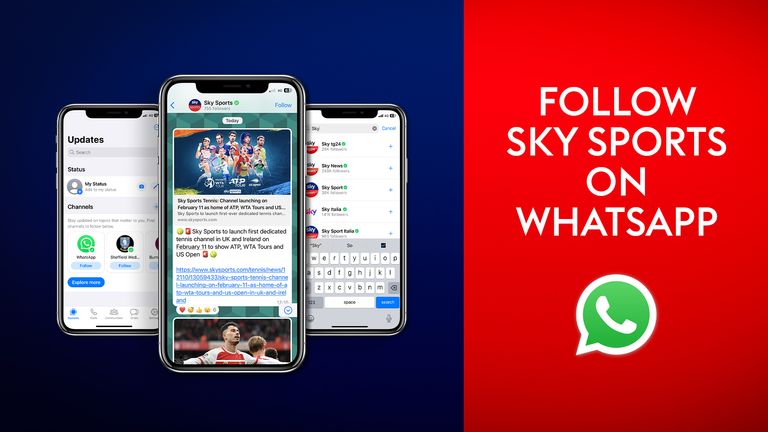Bethany England: Spurs and Lionesses forward - I was told I had endometriosis - I asked 'can I have children?'
Spurs and Lionesses forward Bethany England opens up on eight-year battle with condition before finally getting a diagnosis in exclusive interview with Sky Sports; "It got to the stage where I was in agony. I couldn't stand up, I couldn't walk as the pain was so uncomfortable"
Thursday 7 March 2024 07:07, UK
Bethany England vividly remembers the day she passed out in a supermarket and was taken to hospital in an ambulance.
The endless days lying in bed in agony, curled up with a hot water bottle wanting the excruciating pain to go away.
The times she spent on the physio table after suffering another flare-up, all the while just wanting to join her team-mates on the training pitch.
During her early career at Chelsea, she wanted more than anything to show her ability, skills and justify her signing in January 2016 as one of the brightest prospects in the country from Doncaster Belles.
- Inspiring Inclusion series part one: Eilish McColgan opens up on body confidence issues
- Part Two: Molly McCann - Combat sport leading way in stopping defining sport by gender
- Part Three: Dunkley on inclusion in cricket and friendship that opened door to sport
But her body was failing her - just as the doctors had let her down following a series of appointments and a number of years.
Chelsea, however, turned England's career around. By pushing for more specialist care, the now Tottenham and Lionesses international was finally able to get the care she deserved and a diagnosis she had waited years to hear. She had endometriosis.
Endometriosis is a condition where tissue similar to the lining of the womb grows in other places, such as the ovaries and fallopian tubes and affects one in 10 women. Symptoms can include extreme pain in the lower back and pelvis, painful menstrual cramps, infertility or digestive problems. It is unclear what causes the disease and cannot be prevented.
"There were times when I was at Chelsea and the girls would be out training and I'd be in the physio room on the physio bed just in agony, crying," England tells Sky Sports in an exclusive interview.
"I'll never forget those days because it stopped me doing the job that I love. At the time I was so young, I wanted to impress being at a club like Chelsea and it felt like it was hindering me to be able to do the job that I was brought in to do.
"It got to the stage where I was in agony. I couldn't stand up, I couldn't walk as the pain was so uncomfortable.
"You start thinking 'am I being a bit of a wimp about it', but it turns out there was something more severely wrong and I'm glad that I was in a position and was fortunate enough to get the help I needed at Chelsea, because without them I don't know if I would ever properly be diagnosed."
Manager Emma Hayes was a huge support and confidant for England having also suffered with the condition and taking time out of the game in 2022 to recover from an emergency hysterectomy as part of her ongoing battle with the disease. Chelsea's progressive approach to use a menstrual cycle app to track periods (FitrWoman) in early 2020 also played a pivotal role for England.
"Emma was amazing," the 29-year-old forward said. "She was the one who pushed to have me tested. I don't know that I would've had the money to go private. There's nothing wrong with the NHS but I don't think they were as forthcoming in trying to help me figure out what was wrong with me rather than just describe me some tablets."
'My life has changed since I've had surgery'
England, who was part of the Lionesses Euros-winning squad in 2022 and last summer's World Cup finalists and moved to Tottenham from Chelsea last January for a British-record deal of £250,000, reflects on the day she was given her diagnosis.
After eight years of pain and struggle, there was one immediate question she had.
"The first thing that came out of my mouth was 'would I ever have kids?'
"My whole life I've wanted to have children, and for it, it really put it into perspective that there was an issue on my ovaries and that is this going to affect me going forward to produce a family?"
Endometriosis can cause fertility problems because of damage to the fallopian tubes or ovaries but is another area of female-specific health that is not fully understood.
"Luckily they were able to take the endometriosis away," England said. "But they never know fully how much it has affected your ovaries until they get inside you. As it stands I've been clear of endo and it's not come back yet.
"I still get check-ups because if I go through patches where the pain has increased or decreased I can manage it. But I've had times where I've had to go and make sure that everything is going as it should."
England now has freedom to be able to play and enjoy the sport she loves. Now captain of Tottenham following her 2023 move, she can look ahead. From trying to shake up the establishment at the top end of the Women's Super League table to preparing for this weekend's FA Cup quarter-final at home to Manchester City.
"My life has definitely changed since I've had the surgery and had the coils fitted," she said.
"It makes me not worry about it when I'm on a football pitch. As I don't have periods now, I don't have to worry about leaking through football shorts if we do wear a white kit which we've previously done.
"I can focus on my football and do my job. It's helped me in my day-to-day life knowing that even once a month I still get the same symptoms, the odd cramps, the back aches, the tiredness, it's having more of an awareness of managing it.
"There's been so much research into nutrition and how that can help different phases of your cycle. I've been able to do a lot of research into that and I know what to give my body at different times when it needs it. The more education around that for girls - and even women - going forward it will probably help them alot."
England captain Leah Williamson spoke in 2022 of having endometriosis and her fears that a flare-up ahead of the tournament put her at risk of missing out on the Lionesses' Euros success.
The Arsenal defender was diagnosed in 2021 after suffering heavy periods, while other sportswomen such as American tennis player Danielle Collins and Welsh cyclist and Olympic medallist Elinor Barker have also been honest about their struggles with the condition.
March is endometriosis awareness month and England is keen that the subject is not seen as a taboo and that more young girls and women do not suffer a similar experience of being ignored by doctors.
"By speaking about it and having more open conversations is only going to help push the research and the funding further to help as many women and young girls as possible.
"My advice for others would be, if you have the resources to get checked I would definitely recommend it. Or if you feel like your doctor is pushing it aside a bit, be more demanding that you want answers because ultimately it's your body, it's your health and you should not be suffering because of it.
"The biggest thing is don't be embarrassed and fight for answers to make sure you know what's going on with your body.
"It hindered my life so much that I'm forever grateful that I was able to get it fixed."
For more information go to the endometriosis UK website
Get Sky Sports on WhatsApp
You can now receive messages and alerts for the latest breaking sports news, analysis, in-depth features and videos from our dedicated WhatsApp channel. Find out more here...
